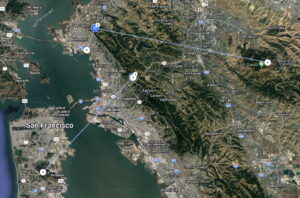Bay Area Backbone: Difference between revisions
(→CCCC) |
(Notes) |
||
| Line 85: | Line 85: | ||
== [[San Rafael Hamilton Wireless Association|San Rafael]] == |
== [[San Rafael Hamilton Wireless Association|San Rafael]] == |
||
| + | ... |
||
| + | |||
| + | =Notes= |
||
| + | |||
| + | === DtD connected nodes === |
||
| + | The backbone is currently being constructed using Part 15 devices acting as bridges between AREDN nodes. The AREDN nodes connect to bridges via the DtD port / VLAN 2. This essentially puts every node at every location in the Backbone on the same VLAN. Consequently, every broadcast from any node connected directly to any Backbone point will have its traffic retransmitted to every other node. This probably isn't a good thing. |
||
| + | Additionally, today the Backbone is a tree (disconnected in place) at the moment, but one day might become a loop or a graph. This would improve redundancy. However, at that point we're introducing loops into out VLAN where broadcast traffic could cycle around continually causing a storm. |
||
Revision as of 14:44, 21 July 2022
The Bay Area Backbone Project is building solid, fast, links between major high sites in the Bay Area, which in turn supports a more stable mesh network. Backbone sites are permanent locations, not dependent on amateur radio operators' homes or difficult to access places.
Fish Ranch / ORCA
San Bruno Mountain
Status: Equipment installed. Not powered.
Connection: Non-AREDN, airFiber 5 GHz.
Notes: The link to San Bruno is from Fish Ranch, and the equipment is installed but not powered (undetected in UISP tool since May 9th, 2022). There may have been a weak signal when it was originally installed (re: Chris 19th July, 2022) and the next step is to align the San Bruno end.
San Bruno Mountain
Fish Ranch / ORCA
Status: Equipment installed. Not powered.
Connection: airFiber 5 GHz.
Notes: The connection to Fish Ranch is somewhat influx due to access to San Bruno Mtn. The state of the installation needs to be improved with some changes to the onwards radios (there's a NSM5 there right now which doesn't really do the job). The best information is that the radio pointing at Fish Ranch is installed and requires adjustments. It may not currently be power and/or not connected to the other AREDN nodes at the site which are powered.
Black Mountain
Status: Proposed
Fire Station 8
Status: Proposed
CCCC
Mount Diablo
Status: Equipment installed. Active.
Connection: Non-AREDN, airFiber 3 GHz. Acts as DtD.
Notes: Connects via DtD over non-AREDN radios, so appears as wired AREDN connection, even though it isn't.
Plans: Re-evaluate the battery system and determine why it fails to provide the constant power required for all the equipment.
Richmond Field Station
Status: Equipment installed, Active.
Connection: Non-Ham, 5 Ghz AC gen2, unknown equipment.
Notes: Connects via DtD over non-AREDN radios, so appears as a wires AREDN connection, even though it isn't.
Mount Diablo
CCCC
Status: Equipment installed. Active.
Connection: Non-AREDN, airFiber 3 GHz.
Note: Connects via DtD over non-AREDN radio.
Richmond Field Station (RFS)
CCCC
Status: Equipment installed, Active.
Connection: Non-AREDN, 5 Ghz AC gen2, unknown equipment.
Notes: Connects via DtD over non-AREDN radio.
Black Mountain
San Bruno Mountain
Status: Proposed
Fire Station 8
San Bruno Mountain
Status: Proposed
San Rafael
...
Notes
DtD connected nodes
The backbone is currently being constructed using Part 15 devices acting as bridges between AREDN nodes. The AREDN nodes connect to bridges via the DtD port / VLAN 2. This essentially puts every node at every location in the Backbone on the same VLAN. Consequently, every broadcast from any node connected directly to any Backbone point will have its traffic retransmitted to every other node. This probably isn't a good thing. Additionally, today the Backbone is a tree (disconnected in place) at the moment, but one day might become a loop or a graph. This would improve redundancy. However, at that point we're introducing loops into out VLAN where broadcast traffic could cycle around continually causing a storm.
